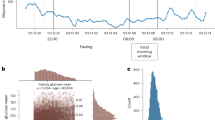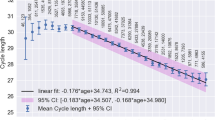Abstract
Objective: The aim of the study was to investigate the reproducibility of a food frequency questionnaire (FFQ) used in a cohort of 14 290 women enrolled in the NYU Women’s Health Study. Design: A subset of 474 cohort subjects who completed the dietary questionnaire at baseline (FFQ-1) were approached again on the occasion of a second visit to the mammography study centre and asked to complete the questionnaire a second time (FFQ-2) two to four years after FFQ-1. Two to three months later the questionnaire was mailed to the subjects, and they were asked to complete it a third time (FFQ-3). Setting: A breast cancer screening clinic. Subjects: Of the 474 subjects selected, 100% completed the second questionnaire while only 56% completed and mailed back FFQ-3. This made it possible to compare the long-term reproducibility of dietary intake measurements and baseline dietary habits between the two groups of subjects: ‘respondents’, who agreed to complete the questionnaire a third time, and ‘non-respondents’, who did not. Results: Among respondents (56% of study subjects), energy-adjusted correlation coefficients for short-term reproducibility between FFQ-2 and FFQ-3 ranged from 0.50–0.64 for nutrients, and from 0.44–0.67 for foods. The long-term reproducibility was lower, ranging from 0.36–0.53 for nutrients, and from 0.31–0.48 for specific food groups. Among those who did not respond to FFQ-3, crude correlations for long-term reproducibility, unadjusted for energy intake, were generally lower than among respondents. Nevertheless, after adjustment for energy intake, correlations for long-term reproducibility (FFQ-2 to FFQ-1) were of similar magnitude in both groups. In addition, ‘non-respondents’ reported lower intake of fruit and vegetables and higher intake of meat. Conclusions: The results of this study suggest that subjects who volunteer to participate in substudies on the validity or reproducibility of dietary questionnaire measurements may tend to provide more accurate responses to the questionnaire. The phenomenon seems related more to accuracy of reporting of absolute intake levels than of the relative composition of diet. In addition, self-selection may be associated with differences in dietary habits. Sponsorship: This study was supported by Public Health Service (PHS) grants CA 34588, CA 13343 and CA 16087 from the National Cancer Institute, National Institutes of Health (NIH), Department of Health and Human Services (DHHS); and by PHS ES 00260 from the National Institute of Environmental Health Sciences, NIH, DHHS.
This is a preview of subscription content, access via your institution
Access options
Subscribe to this journal
Receive 12 print issues and online access
$259.00 per year
only $21.58 per issue
Buy this article
- Purchase on Springer Link
- Instant access to full article PDF
Prices may be subject to local taxes which are calculated during checkout
Similar content being viewed by others
Author information
Authors and Affiliations
Rights and permissions
About this article
Cite this article
Riboli, E., Toniolo, P., Kaaks, R. et al. Reproducibility of a food frequency questionnaire used in the New York University Women’s Health Study: Effect of self-selection by study subjects. Eur J Clin Nutr 51, 437–442 (1997). https://doi.org/10.1038/sj.ejcn.1600422
Received:
Revised:
Accepted:
Issue Date:
DOI: https://doi.org/10.1038/sj.ejcn.1600422
Keywords
This article is cited by
-
Recall of residential history and dietary habits during pregnancy and lactation in the distant past: reliability of questionnaire-based radiation doses for persons exposed in utero and early life
Radiation and Environmental Biophysics (2023)
-
A meta-analysis of the reproducibility of food frequency questionnaires in nutritional epidemiological studies
International Journal of Behavioral Nutrition and Physical Activity (2021)
-
Serum taurine and risk of coronary heart disease: a prospective, nested case–control study
European Journal of Nutrition (2013)
-
Validity of a questionnaire to assess fruit and vegetable intake in adults
European Journal of Clinical Nutrition (2006)
-
Vegetable and Fruit Food Frequency Questionnaire Serves as a Proxy for Quantified Intake
Canadian Journal of Public Health (2006)



